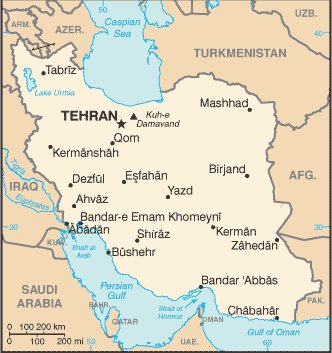The government Iran has enough revenue to withstand a total embargo on its oil exports for two to three years, according to President Mahmoud Ahmadinejad in a speech just days before a resumption of negotiations with world powers on Tehran’s nuclear program.
 “We must say to them that we have that much saved that even if we didn’t sell oil for two to three years, the country would manage easily,” the Iranian Fars news agency quoted Ahmadinejad as saying. Countries that are cutting back imports of Iranian crude include the U.S., much of the EU, Turkey, Japan, Philippines, Taiwan, Malaysia, India and others – and not all have been fully implemented yet.
“We must say to them that we have that much saved that even if we didn’t sell oil for two to three years, the country would manage easily,” the Iranian Fars news agency quoted Ahmadinejad as saying. Countries that are cutting back imports of Iranian crude include the U.S., much of the EU, Turkey, Japan, Philippines, Taiwan, Malaysia, India and others – and not all have been fully implemented yet.
The U.S.-led international economic sanctions on Iranian oil and financial markets, whether Ahmadinejad likes to admit it or not, is having its effect. It may be true that the government is in some ways insulated from the effects as of now, but Iran’s economy – and its people – are suffering from what Columbia University Professor Gary Sick has called “the equivalent of a blockade. It’s an act of war.”
Iranian oil exports fell by about 300,000 barrels per day in March. The International Energy Agency recently said that oil exports may fall by as much as 1 million barrels per day by the middle of the year. That’s a 40 percent cut in overall exports.
“With the Iranian sanctions,” writes David Ignatius in the Washington Post, “the bite may actually be worse than the bark. That’s because in a globalized economy, decisions taken at the financial hubs in America, Europe and Japan can move instantaneously along the world’s financial nervous system to the most distant nodes.”
And indeed they have moved instantaneously. Back in January reports came out about rampant inflation and rising unemployment in Iran, as sanctions began to kick in and international markets braced for an isolated Iranian economy.
Politicos in Washington justify the sanctions on the grounds that Iran has a latent nuclear weapons program, but there is a consensus in the U.S. military and intelligence community that Iran is not developing nuclear weapons and has demonstrated no intention of doing so. Still, draconian economic sanctions which severely harm the Iranian people continue, primarily for domestic political reasons and to pacify Israel.
Iran has signaled a willingness to compromise in the nuclear talks set to begin Friday, but unless the Obama administration reciprocates, the talks could fail and then be used to legitimize a military strike on Iran for a nuclear weapons program it doesn’t have.


